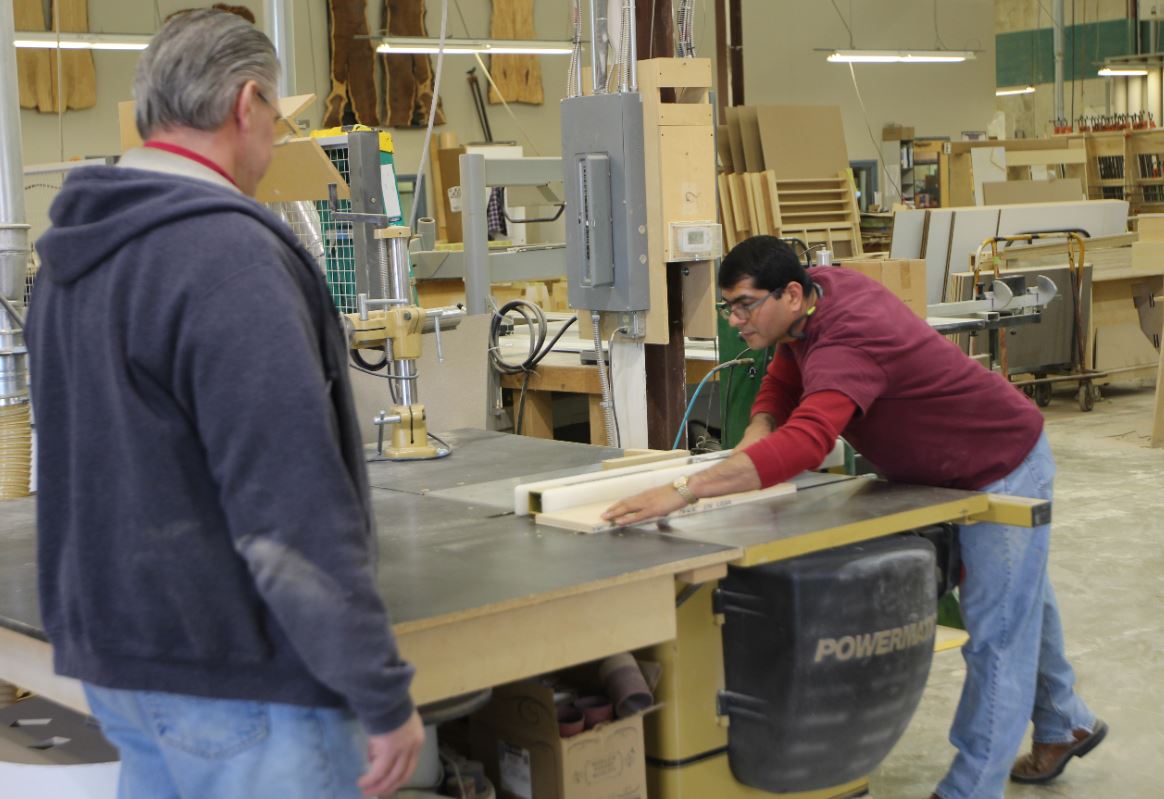How WCA’s Credentialing Program Maps Career Paths for Woodworking Pros
According to a 2021 study conducted by Woodworking Network and the Woodwork Career Alliance of North America, nearly three-quarters (73.8%) of participating woodworking representatives indicated it is “very challenging” to hire qualified workers for their manufacturing operations. What’s more, most (57.9%) said the challenge to find and hire good help is “much more challenging” than three years before.
We are willing to wager that hiring issues remain the woodworking industry’s number one concern. The skilled worker shortage is a universal and perpetual problem for all of the skilled trades that promises to only worsen as more Baby Boomers retire.
Knowing that the woodworking industry’s skills gap would not fix itself, the Architectural Woodwork Institute and U.S. Forest Service partnered to found the Woodwork Career Alliance of North America in 2007. The overarching goals of the not-for-profit WCA are to elevate woodworking as a profession, support workforce development through the creation of skill standards, and create career paths based on the Passport credentialing program recognized throughout the U.S. and Canada. WCA credentials encompass measurable skill standards for more than 240 woodworking operations and machines ranging from accurately reading a tape measure and safely setting up and using a table saw through spray finishing and operating a CNC router.
Creating Career Pathways
How can the woodworking industry benefit from a robust, nationally-recognized credentialing program?
For a clue, take a look at how well-established credentialing programs are helping the automotive, metalworking and welding industries recruit, train and retain skilled workers. And keep in mind that these are but three skilled-job industries with which wood product companies compete for qualified help.
- Established in 1972, the National Institute for Automotive Service Excellence administers one of the best-known credentialing programs. More than a quarter million ASE technicians and mechanics are employed at dealer and independent auto clinics. In addition to elevating career opportunities for auto care professionals, shops that embrace ASE certification can promote that their mechanics are ASE certified to earn the trust and business of consumers.
- The National Institute for Metalworking Skills was formed in 1994 to establish industry skill standards, certify individual skills against the standards, and accredit training programs meeting NIMS quality requirements. NIMS has developed skills standards for everything from machining through industrial maintenance. More than 150,000 credentials have been issued in precision metalworking and industrial maintenance disciplines.
- The American Welding Society offers nine different certification categories from inspectors and supervisors to engineers and fabricators. Since its introduction in 1976, more than 100,000 welding inspector certifications alone have been awarded.
In comparison, the WCA has now issued more than 6,000 Passport credentials, a portable, personal permanent record documenting each holder’s record of woodworking skill achievements. The WCA’s issuance of Passports is accelerating. More than 1,400 were issued in 2022. More than 950 Passports have been issued so far this year.
Setting the Standard of Professionalism
No matter what the occupation, the success of an industry-developed and validated credentialing program hinges on the buy-in of employees and employers alike. Some of the shared attributes of most credentialing programs for the skilled trades, include:
- Certified professionals receive the respect and recognition they deserve for their commitment to professional development. Their credentials make them more marketable to find a job and more desirable for companies to want to hire them.
- Employers can incorporate industry skill standards to help frame their training programs and develop incentive programs based on employees successfully achieving new skills. This creates a tool that can be used both for recruitment and retention.
- Because they are based on industry-accepted standards, the individual’s credentials are transferrable from one employer to the next.
- Professional credential programs are promoted to high schools and postsecondary CTE programs to help make their curricula more relevant in preparing students for successful careers in modern-day manufacturing.
The Training Dilemma
The Woodworking Network/WCA workforce study found that only 21.2% of companies have a written training procedures while 40.4% have no formal training program at all. The initial thrust of the WCA’s outreach has been working with high school and postsecondary woodworking programs to adopt the WCA credentialing programs to teach students how to safely and efficiently operate woodworking eqiupment to industry-vetted skill standards. More recently, the WCA has looked to bring more woodworking companies on board as MANufacturing members.
The bottom line is that woodworking employers want people who are dependable, trainable and committed. On the other side of the coin, employees want to be fairly compensated and have opportunities to advance their careers as payback for committing their time and energy to become more skilled and productive woodworkers.
The WCA, with its skill standards and Passport credential program firmly in place, has set the foundation to bring the two sides together so that the woodworking industry can develop and grow a skilled workforce. We encourage everyone who has a stake in the long-term health and prosperity of this time-honored vocation to lift up the hood and take a closer look at what the WCA has to offer.






